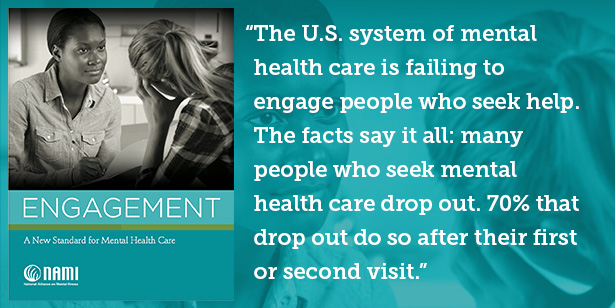
As an organization of individuals with mental health conditions and their families, NAMI knows that the U.S. system of mental health care is failing to engage many people who seek help. The facts say it all: many people who seek mental health care drop out. 70% that drop out do so after their first or second visit.1
The first moments of interaction between a service provider and a person seeking care for a mental health condition can set the tone and course of treatment. This first interaction can start a journey to recovery and a satisfying life—or it can leave a person unsure or even hopeless about their future and unwilling to go back a second time. The same is true about interactions with others in the community; a person who has been told that people with mental illness are scary, weak or unable to care for themselves may not seek help or may avoid telling others the full extent of what they are experiencing.
“My son’s first break was when he was most open to the idea of engagement. He was scared and didn’t know what was going on. He voluntarily went to see a psychiatrist, but the manner in which he was treated really closed the door at that opportune moment. The psychiatrist was proud of being the kind of doctor who tells it like it is. He told my son, ‘you have a mental illness and are going to be on medications for the rest of your life. They’ll probably cause you to gain significant weight, and you probably won’t be able to work in a regular job. If you don’t take the medications, you are going to end up homeless, in jail or dead.’ My son’s reaction was to reject that and to close the door on treatment.”
—Pete Earley
This story of lost opportunity for engagement is far from an isolated experience. NAMI hears such stories repeatedly—and they often end with tragic consequences.
Such stories illustrate the need for a shift in the culture of our country’s mental health system.
Recovery is possible and achieved by many, but for countless others, a mental health diagnosis leads to needless trauma, losses and shortened lives. When the mental health system fails to engage people early and treat them with dignity and respect, too many people leave school, lose jobs, get arrested, become homeless or attempt suicide.
While there are many reasons people do not engage in mental health services and supports, including in some cases lack of insight, this report focuses on the foundation: the relationships between people with mental illness and service providers, families and the broader community. Trusting and respectful relationships are the basis for recovery.
The systemic indifference of the mental health system would not be tolerated in the treatment of other conditions; people with other serious illnesses are treated with respect and care. They and their families are supported in care and recovery. Many people with mental illness are handcuffed during psychiatric crises, discharged to parking lots, jailed, turned away from services and left to live on the streets. Many never experience what should be the most basic standard of care in the mental health system: a healing connection with a mental health professional, dignity, respect and a sense of hope.
The U.S. mental health system needs to promote more effective engagement. As the stories in this report indicate, effective engagement should be the foundation of mental health services, not merely an aspiration.
There is an assumption that mental health treatment is good. Are we asking people to engage in bad mental health treatment?
—Ann-Marie Louison, MSW
A fundamental shift in the culture of mental health care delivery is critical. Now is the time to act. NAMI calls on providers, payers and health systems to take the following steps to promote a culture of engagement:
I have seen the magic that happens when people can talk openly and deeply with a peer supporter while they are in the hospital.
—Kevin Huckshorn, Ph.D.
Training should be culturally sensitive and competent to effectively meet the needs of individuals and families in diverse communities.
The culture shift embodied in the steps and principles above may appear simple and intuitive, but it has significant implications. Adopting a culture of engagement requires a reorientation of how we provide and pay for mental health services. Moreover, it requires a fundamental change in how we view mental illness and people who live with mental health conditions. This culture shift is essential to promoting connection to care and the hope of recovery for Americans who live with mental health conditions—from those who are experiencing first symptoms to those who have struggled with severe and complex conditions for decades.
Appendix B includes promising engagement practices and programs. They offer hope and shining examples of the impact of effective engagement. As we create a new standard for mental health care, effective engagement should transcend specialty programs and exist wherever individuals access mental health services and supports.
We need to speak a powerful message that reaches into the darkness and lets people know what is happening in the light. People need to see the tangible thing that is recovery.
—Bill Carruthers, CPS
Engagement (\in-ˈgāj-mənt) is the strengths-based process through which individuals with mental health conditions form a healing connection with people that support their recovery and wellness within the context of family, culture and community.
Share when you or your family felt most engaged in mental health services and supports. Share when you or your family felt most disengaged in mental health services and supports.
Remember to tag your entry with #EngageMe.
NAMI HelpLine is available M-F, 10 a.m. – 10 p.m. ET. Call 800-950-6264,
text “NAMI” to 62640, or email. In a crisis, call or text 988 (24/7).